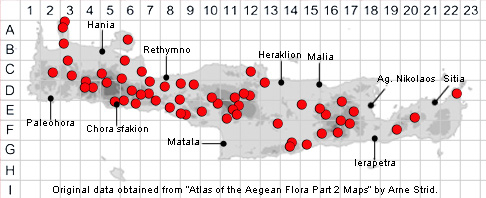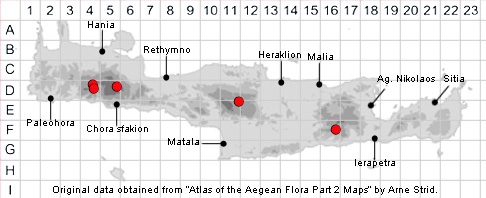SPECIES DESCRIPTION
VERONICA ARVENSIS
Including Veronica sartoriana
Family and Genus:- See- PLANTAGINACEAE/Sect. POCILLA
Common Names:- Wall speedwell
Synonyms:- None
Meaning:- Veronica (L) For Saint Veronica, who wiped the sweat from Christ's
face.
Arvensis (L) Of the cultivated field, of ploughed fields.
General description:- Ascending to erect annual.
Stems:-
1) (2-)5-40 cm, simple and erect to much-branched and procumbent, pubescent,
and often slightly glandular above.
Leaves:-
1) 2-15 mm, triangular-ovate with truncate or a weakly cordate base, crenate-
serrate, pubescent or subglabrous;
a) lower, shortly petiolate.
b) upper sessile.
Flowers:-
1) In racemes.
2) Bracts, longer than the pedicels;
a) upper lanceolate.
b) lower ovate.
3) Calyx-segments, lanceolate.
4) Corolla, 2-3 mm diam, blue.
5) Style, c. 1 mm, scarcely exceeding the sinus.
Fruit:-
1) Capsule, c. 3 x 3 mm, obcordate, flat, usually subglabrous except for marginal
cilia.
2) Seeds, c. 1 x 0·75 mm, elliptical, flat.
Key features:-
1) Corolla, blue.
2) Upper cauline leaves, not pinnatifid.
Habitat:- Seasonally damp, sandy flats, cultivated and fallow fields, olive groves,
meadows. 0-900(-1700 m. in dolines).
Distribution:- Throughout mainland Greece but seemingly rare in the far NE. -
Europe and SW Asia, Widely scattered across Crete.
Flowering time:- Mar-June.
Photos by:- Courtesy of Wiki-Commons
VERONICA SARTORIANA
Meaning:- Sartoriana (L) For Andria del Sarto (1486-1531) of Tailors.
Very similar to Veronica arvensis, but varying in the following characters
1) Bracts, ± spathulate.
2) Not more than twice as long as the pedicel.
3) Corolla, 4-6 mm diam., exceeding the calyx.
4) Capsule, somewhat larger with the style c. 1 mm.
This species was described from Mt Pamitha, where it was said to grow together
with Veronica arvensis.
Further studies are needed to determine whether the two are consistently distinct.1)
1) "Atlas of the Aegean Flora" Book 1 Arne Strid 2016
Habitat:- Rocky and stony places in open coniferous woodland and pastures (800-)
1200-2100 m.
Flowering time:- April-June
Distribution:- Endemic; also reported from Peloponnisos, Stera Elias and Kefalonia
(Mt. Enos)
~~~~~~~~~~~~~~~~~~~~~~~~~~~~~~~~~~~~~~~~~~~~~~~~~~~~~~~~


